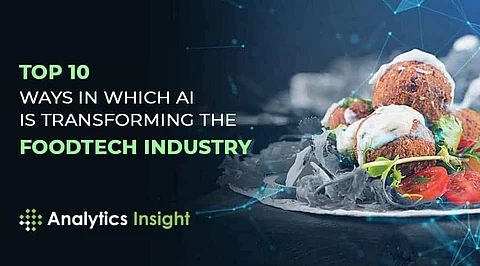

The food technology industry is one of the most significant businesses among the various manufacturing industries in the world. The implementation of artificial intelligence, machine learning, and deep learning has automated several complex issues that the industry faced primarily. Artificial intelligence along with data science has improved the quality of restaurants, cafes, online food delivery systems, and food outlets, by increasing production and utilizing different fitting algorithms to boost sales. Here, we will go through some of the top artificial intelligence innovations and how it has transformed the food tech industry.
Alternative Proteins: Cultured meats and plats are the primary sources of alternative proteins that are currently available. They are not only nutrient-rich, but they also minimize resource use. These products also reduce the overall costs of consumption as they are required only for marginal dietary requirements and health monitoring. The technological advancements in fermentation and molecular biology have enabled companies to sustainable alternate protein production solutions.
3D Food Printers: 3D food printers enable personalized diets and alternative protein-based meals that also offer proper nutrition to our bodies. Regardless of that fact the material extrusion is one of the most common types of food printing methods, companies have also started to use laser, inkjet food printing, and bioprinting methods, to develop food products. This technology can meet unrecognized needs in terms of personalized nutrition, food wastage, and demands.
Smart Food-Waste Tracker: Studies have revealed that a large amount of food produced globally is either lost or wasted. Therefore, recent AI innovations have formulated technological solutions to minimize and track food wastage around the world. These monitoring solutions help food producers, restaurants, hotels, and smart cities to reduce food waste. This innovation has also brought along a paradigm shift from food wastage to zero waste approaches in food manufacturing companies.
Automated Kitchens: The idea of using robots in a kitchen seems quite astonishing, but it is a reality now. In recent years, restaurants are opting for automated tools and machines to ease up the work pressure. Automated kitchens refer to a restaurant or any kitchen that is using robots to cook and prepare food. These robots are precision cooks that are trained to cook according to the chefs' choices and plans.
Autonomous Food Serving Robots: A food serving robot autonomously serves foods and drinks. These robots can assist waiters in carrying dishes and innovating creative ways to keep the diners satisfied. Restaurants and hotels are hugely benefitting from this innovation. These robots are intelligent, automatic, and contactless. These machines can also automate the food or beverage-making process with fewer mistakes. It can also enrich the existing menus, and reduce food waste.
Nutraceuticals: The emergence of the coronavirus pandemic has made individuals focus more on personal nutrition and healthy eating habits. This has made nutraceuticals one of the top innovations in the food industry. Scientists researching nutraceuticals have suggested that these products provide health benefits against disorders related to oxidative stress like allergy, diabetes, and immune diseases.
Forward Osmosis: Osmosis has several life-preserving functions, which prove useful for food preservation. It is promising membrane technology that is extensively finding its usage in the food industries for liquid food concentration. Packaged juices tend to lose color, flavor, and nutritional compounds while processing compared to fresh juices. Implementing this technology will help manufacturers retain all these aspects in packaged liquids, without any health drawbacks.
Ghost Kitchens: Ghost kitchens are food prep operations or restaurants with no waiters, no dining room, no takeaways, basically with no public presence. These kitchens are only available online. Restaurants appearing as ghost kitchens generally appear as normal restaurants on the online food delivery apps. This inculcates more usage of food delivery apps at a time when the need for social distancing is at its peak.
Restaurant Voice Bots: Artificial intelligence-enabled voice bots are basically automated conversational AI agents that automate the food ordering process using just voice-to-search features, and choose or pick. These robots are capable of human language. Such voice-activated software products can improve productivity and minimize human errors. There are several food applications and platforms that have inculcated this innovation to improve customer experiences.
Vertical Farming: Vertical farming is the practice of farming vegetables and other foods in vertically stacked layers, especially in structures like a skyscraper, shipping container, or a repurposed warehouse. The artificial control of temperature, light, humidity, and gases has made it possible for the production of food and medicine indoors. The primary goal of vertical farming is to maximize food production in a limited space.
Recent developments in artificial intelligence and data management have shown some promising solutions to optimize the food industry. One of the primary attributes of using AI in the future is that the data used has to be very high quality. The grocery industry is also using AI to offer customers targeted facilities to manage inventory. In the future, AI can help eradicate food wastage and inefficiency in food systems, but it will always be up to us to utilize these resources efficiently.
Join our WhatsApp Channel to get the latest news, exclusives and videos on WhatsApp
_____________
Disclaimer: Analytics Insight does not provide financial advice or guidance on cryptocurrencies and stocks. Also note that the cryptocurrencies mentioned/listed on the website could potentially be scams, i.e. designed to induce you to invest financial resources that may be lost forever and not be recoverable once investments are made. This article is provided for informational purposes and does not constitute investment advice. You are responsible for conducting your own research (DYOR) before making any investments. Read more about the financial risks involved here.
